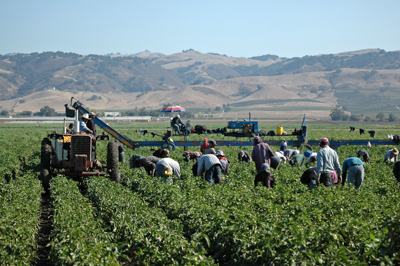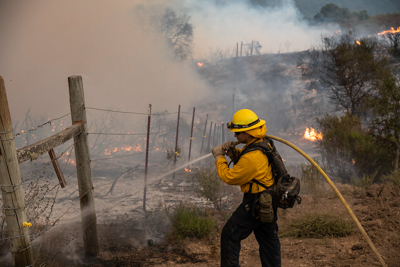Last week, in partnership with the state, the University of California awarded more than $80 million in California Climate Action Grants to four-year academic institutions across the state. These two-year grants are designed to spur the implementation of solutions that advance climate resilience and social equity. Five UC Santa Cruz projects secured a total of more than $9.5 million in funding through the program, and three faculty members received additional sub-awards totaling more than $2 million. Below we are highlighting the two projects that were funded in community-engaged research.
Supporting farmworker health and safety

Another $1.99 million grant will help to equip California farmworker communities with new tools to address the damaging impacts of climate change on their health and livelihoods. Politics Professor and Global & Community Health Program Executive Vice Director Matt Sparke will lead the project, with support from a broad contingent of 18 UC Santa Cruz faculty and partners at 10 community organizations and four other universities across the state.
The team will map out climate-related risk factors—like extreme heat, wildfire smoke, drinking-water pollution, flood damage, and crop failures—that disproportionately affect farmworkers and increase their vulnerability to ill-health, stress, and depression. A new bilingual app will share this information so that farmworkers, health workers, and farm supervisors can easily identify geographic “hotspots” of risk. The app and associated website will also include a health vulnerability checklist to help users identify key resources available or needed in their area to mitigate climate-related harms, and users can submit their responses to provide new data on these issues.
The project will additionally build partnerships among farmworkers, community health workers, growers, governments, and other stakeholders in the Pajaro, Salinas, and San Joaquin Valleys to develop solutions for the health and safety of farmworkers. Students from UC Santa Cruz and local high schools will support these efforts. Researchers will also study how new strategies and technologies that agricultural businesses might use to adapt to climate change could affect farmworkers, and the team will test some nature-based solutions with positive potential.
“Our approach is ultimately about adapting to the challenges that come with living in a climate-changed world, but this is not a passive adaptation or a vision of resilience that is about returning to the status quo,” Sparke said. “The goal is really to build back better—based upon the deep knowledge that farmworkers, growers, and government officials already have—in ways that enable people to be positive change agents.”
Connecting the housing crisis to climate impacts

Professor of Sociology Miriam Greenberg will lead a roughly $1.6 million grant project to conduct a first-of-its kind study of how California’s housing crisis affects the growth of the Wildland Urban Interface (WUI), where the fringes of development reach into natural areas. Development in the WUI now accounts for 50% of all new housing in the state, but the proximity to fire-prone landscapes and remoteness from emergency response services increases the risk from climate-related natural disasters. WUI development also impacts environmental health.
Researchers from the social sciences will conduct statistical and GIS analysis alongside interviews and surveys of WUI residents in order to identify areas where WUI development trends may primarily reflect lower income people being displaced from urban areas. Together with community partners—including Community Bridges, the Monterey Bay Central Labor Council, and the Santa Cruz County Office of Response, Recovery & Resilience—research teams will study what’s driving migration to the WUI, from affordability pressures to lifestyle choices; the demographics of this migration; and resulting dynamics, like growing commute sheds and vulnerability to hazards. The project will focus on California’s Central Coast, one of the most unaffordable housing markets in the U.S.
The team will also work with the Amah Mutsun Relearning Program and the Native Plant Program at the UCSC Arboretum & Botanic Garden and the Central Coast Prescribed Burn Association to study how the WUI impacts the effectiveness of prescribed burns for restoring culturally and ecologically significant habitat. They’ll use their findings to define different types of WUI impacts on fire and habitat and to demonstrate how some fire management and land stewardship strategies are best suited to certain WUI types. Researchers will also analyze the relationship between the WUI and puma behavior, demonstrating how different types of WUI development have varying habitat fragmentation impacts. Overall, results from the project will be shared through a “WUI Equity Atlas,” an interactive, online regional planning tool that will show connections between housing, climate, and conservation issues over space and time. The group will groundtruth the atlas through regional gatherings hosted by the Trust for Public Land.
“We see this as an opportunity to bring together a wide range of people who care about each of these issues,” Greenberg said. “Bringing those conversations together and showing people how these crises are related can help to center the critical need for affordable urban housing as part of the climate action and sustainability movement.”
Each facet of the project will require new scientific research and close collaboration with partners, including Indigenous groups, community organizations, and nonprofits. The resulting exhibition will travel to university and public art museums across California. The project ultimately aims to improve understanding and problem solving around climate change in a way that addresses inequities in impacts.